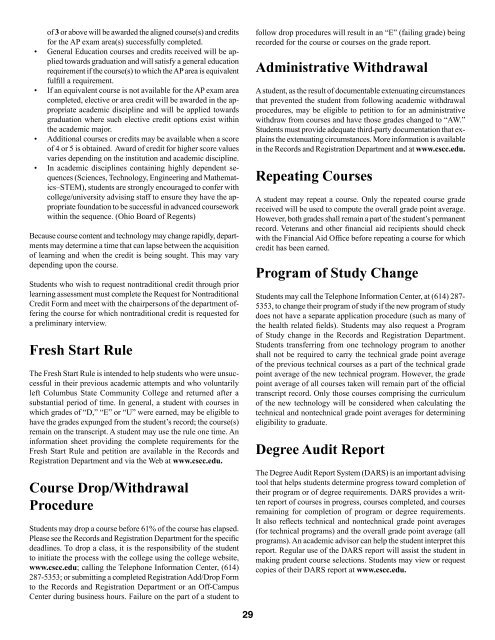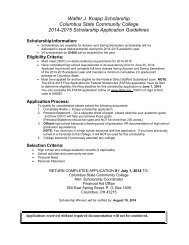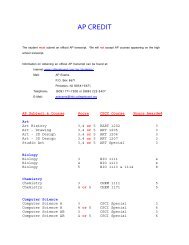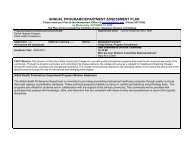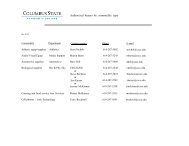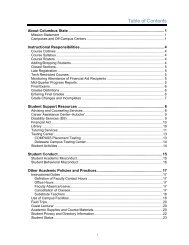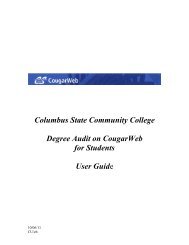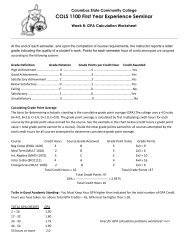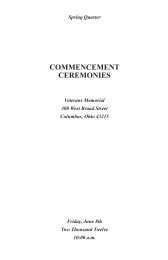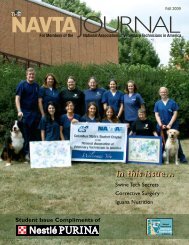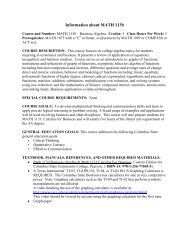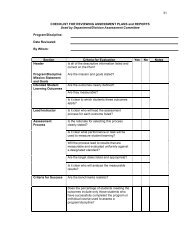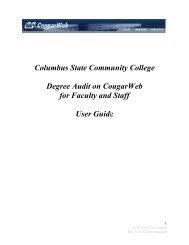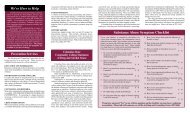2011-2012 Catalog - Columbus State Community College
2011-2012 Catalog - Columbus State Community College
2011-2012 Catalog - Columbus State Community College
Create successful ePaper yourself
Turn your PDF publications into a flip-book with our unique Google optimized e-Paper software.
of 3 or above will be awarded the aligned course(s) and credits<br />
for the AP exam area(s) successfully completed.<br />
• General Education courses and credits received will be applied<br />
towards graduation and will satisfy a general education<br />
requirement if the course(s) to which the AP area is equivalent<br />
fulfill a requirement.<br />
• If an equivalent course is not available for the AP exam area<br />
completed, elective or area credit will be awarded in the appropriate<br />
academic discipline and will be applied towards<br />
graduation where such elective credit options exist within<br />
the academic major.<br />
• Additional courses or credits may be available when a score<br />
of 4 or 5 is obtained. Award of credit for higher score values<br />
varies depending on the institution and academic discipline.<br />
• In academic disciplines containing highly dependent sequences<br />
(Sciences, Technology, Engineering and Mathematics–STEM),<br />
students are strongly encouraged to confer with<br />
college/university advising staff to ensure they have the appropriate<br />
foundation to be successful in advanced coursework<br />
within the sequence. (Ohio Board of Regents)<br />
Because course content and technology may change rapidly, departments<br />
may determine a time that can lapse between the acquisition<br />
of learning and when the credit is being sought. This may vary<br />
depending upon the course.<br />
Students who wish to request nontraditional credit through prior<br />
learning assessment must complete the Request for Nontraditional<br />
Credit Form and meet with the chairpersons of the department offering<br />
the course for which nontraditional credit is requested for<br />
a preliminary interview.<br />
Fresh Start Rule<br />
The Fresh Start Rule is intended to help students who were unsuccessful<br />
in their previous academic attempts and who voluntarily<br />
left <strong>Columbus</strong> <strong>State</strong> <strong>Community</strong> <strong>College</strong> and returned after a<br />
substantial period of time. In general, a student with courses in<br />
which grades of “D,” “E” or “U” were earned, may be eligible to<br />
have the grades expunged from the student’s record; the course(s)<br />
remain on the transcript. A student may use the rule one time. An<br />
information sheet providing the complete requirements for the<br />
Fresh Start Rule and petition are available in the Records and<br />
Registration Department and via the Web at www.cscc.edu.<br />
Course Drop/Withdrawal<br />
Procedure<br />
Students may drop a course before 61% of the course has elapsed.<br />
Please see the Records and Registration Department for the specific<br />
deadlines. To drop a class, it is the responsibility of the student<br />
to initiate the process with the college using the college website,<br />
www.cscc.edu; calling the Telephone Information Center, (614)<br />
287-5353; or submitting a completed Registration Add/Drop Form<br />
to the Records and Registration Department or an Off-Campus<br />
Center during business hours. Failure on the part of a student to<br />
follow drop procedures will result in an “E” (failing grade) being<br />
recorded for the course or courses on the grade report.<br />
Administrative Withdrawal<br />
A student, as the result of documentable extenuating circumstances<br />
that prevented the student from following academic withdrawal<br />
procedures, may be eligible to petition to for an administrative<br />
withdraw from courses and have those grades changed to “AW.”<br />
Students must provide adequate third-party documentation that explains<br />
the extenuating circumstances. More information is available<br />
in the Records and Registration Department and at www.cscc.edu.<br />
Repeating Courses<br />
A student may repeat a course. Only the repeated course grade<br />
received will be used to compute the overall grade point average.<br />
However, both grades shall remain a part of the student’s permanent<br />
record. Veterans and other financial aid recipients should check<br />
with the Financial Aid Office before repeating a course for which<br />
credit has been earned.<br />
Program of Study Change<br />
Students may call the Telephone Information Center, at (614) 287-<br />
5353, to change their program of study if the new program of study<br />
does not have a separate application procedure (such as many of<br />
the health related fields). Students may also request a Program<br />
of Study change in the Records and Registration Department.<br />
Students transferring from one technology program to another<br />
shall not be required to carry the technical grade point average<br />
of the previous technical courses as a part of the technical grade<br />
point average of the new technical program. However, the grade<br />
point average of all courses taken will remain part of the official<br />
transcript record. Only those courses comprising the curriculum<br />
of the new technology will be considered when calculating the<br />
technical and nontechnical grade point averages for determining<br />
eligibility to graduate.<br />
Degree Audit Report<br />
The Degree Audit Report System (DARS) is an important advising<br />
tool that helps students determine progress toward completion of<br />
their program or of degree requirements. DARS provides a written<br />
report of courses in progress, courses completed, and courses<br />
remaining for completion of program or degree requirements.<br />
It also reflects technical and nontechnical grade point averages<br />
(for technical programs) and the overall grade point average (all<br />
programs). An academic advisor can help the student interpret this<br />
report. Regular use of the DARS report will assist the student in<br />
making prudent course selections. Students may view or request<br />
copies of their DARS report at www.cscc.edu.<br />
29


